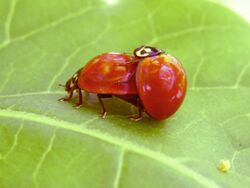Biology:Cycloneda sanguinea
| Cycloneda sanguinea | |
|---|---|

| |
| Mating pair | |
| Scientific classification | |
| Domain: | Eukaryota |
| Kingdom: | Animalia |
| Phylum: | Arthropoda |
| Class: | Insecta |
| Order: | Coleoptera |
| Infraorder: | Cucujiformia |
| Family: | Coccinellidae |
| Genus: | Cycloneda |
| Species: | C. sanguinea
|
| Binomial name | |
| Cycloneda sanguinea (Linnaeus, 1763)
| |
| Synonyms | |
|
Coccinella sanguinea Linnaeus, 1763 | |
Cycloneda sanguinea, also known as the spotless lady beetle, is a widespread species of ladybird beetle in the Americas.
Distribution
Cycloneda sanguinea is the most widespread ladybird beetle in Latin America,[1] with a distribution that ranges from the southern United States to Argentina ,[2] and eastward to the Cayman Islands.[3] On the Galápagos Islands, it lives in sympatry with its sister species, Cycloneda galapagensis.[2]
Description
Cycloneda sanguinea is a large ladybird beetle with red, unspotted elytra (wing covers). The color ranges from orange to deep red. The white and black marks on the head and pronotum are very distinctive, and they are also gender-specific. Females and males both have white spots on the black part, but the female has black in the center, continuing down into the face, while the male has a white cleft above the head and a white face. These ladybugs are very often found feeding on aphids on milkweeds, but also occur on a number of other plants.[3] Its pupae have the remarkable ability to "bite" potential predators using a device known as a "gin trap".[4]
References
- ↑ Charles Leonard Hogue (1993). "Ladybird beetles". Latin American Insects and Entomology. University of California Press. pp. 275–276. ISBN 978-0-520-07849-9. https://books.google.com/books?id=3CTf8bnlndwC&pg=PA276.
- ↑ 2.0 2.1 Stewart Blaine Peck (2006). "Family Coccinellidae. The Ladybird Beetles". The Beetles of the Galápagos Islands, Ecuador: Evolution, Ecology, and Diversity (Insecta: Coleoptera). NRC monograph publishing program. NRC Research Press. pp. 200–205. ISBN 978-0-660-19421-9. https://books.google.com/books?id=yQHz6Iq5_DAC&pg=PA204.
- ↑ 3.0 3.1 R. R. Askew (1994). "Insects of the Cayman Islands". in M. A. Brunt & J. E. Davies. The Cayman Islands: Natural History and Biogeography. Volume 71 of Monographiae Biologicae. Springer. pp. 333–356. ISBN 978-0-7923-2462-1. https://books.google.com/books?id=9rjEbZWPLvcC&pg=PA349.
- ↑ Thomas Eisner, Maria Eisner & Melody Siegler (2005). "Cycloneda sanguinea. A ladybird beetle". Secret Weapons: Defenses of Insects, Spiders, Scorpions, and Other Many-legged Creatures. Harvard University Press. pp. 206–210. ISBN 978-0-674-01882-2. https://books.google.com/books?id=rjPZWwhS7GUC&pg=PA208.
External links
- Salgado-Neto, Geraldo; Vaz, Marcos André Braz; Guedes, Jerson Vanderlei Carús; Muniz, Marlove Fátima Brião; Blume, Elena; Wilcken, Carlos Frederico; Castro, Bárbara Monteiro de Castro e; Plata-Rueda, Angelica et al. (5 February 2018). "Dispersion of the soybean root rot by Cycloneda sanguinea (Coleoptera: Coccinellidae)". Scientific Reports 8 (1): 2409. doi:10.1038/s41598-018-20587-8. PMID 29402912. Bibcode: 2018NatSR...8.2409S.
Wikidata ☰ Q2851700 entry
 |

